Winning the Presidential election
By Publisher Lee Kyung-sik
President Yoon Suk-yeol of the Republic of Korea assumes office and begins his work on May 10 this year as the new (20th term) President of the Republic of Korea.
Now with Yoon in place, the Republic of Korea appears to be in ‘good hands’ in the opinion of many people in Korea.
Traditionally, the Republic of Korea (south) is a pro-American and pro-West country, perhaps, with the sole exception of the five years under the soon-to-leave government of President Moon Jae-in.
During the past five years, the Korean government has been somewhat bent on seeking improvement of relations with the North Korean regime of Chairman Kim Jong-un—with little success.
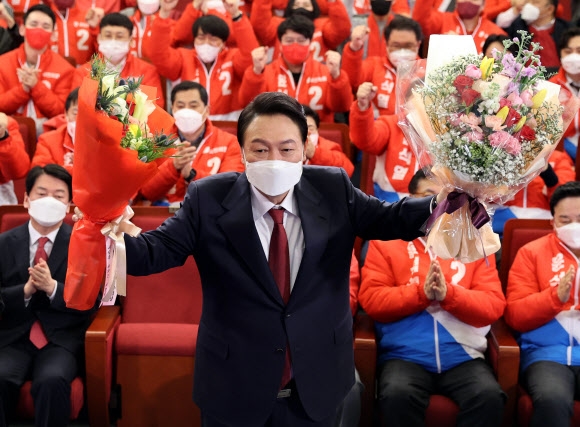
Expectations are now very high in Korea with the new government to come on May 10 led by new President Yoon as the new leader of the country to steer the nation for the next five years.
Many people in Korea today feel that now the country has come back into the proper orbit of continued progress in all areas, especially the foreign relations, economic development/growth and national defense.
President-elect Yoon wins a wide range of acclaim in Korea for his return to the pro-U.S. and pro-West stance in his foreign policy ideas and style of management of government in the domestic and all other areas.
At this time, it might not be amiss to shed light on the person and various other aspects of President-elect Yoon.
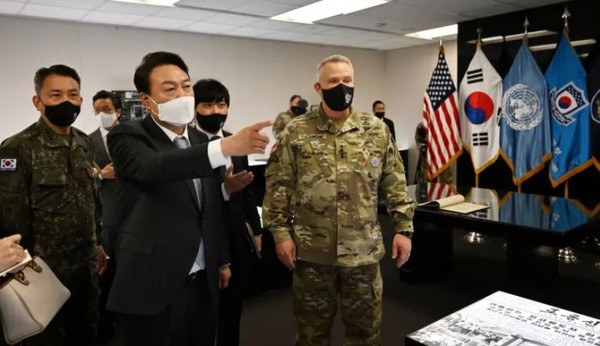
Wikipedia has an adequate measure of information on President-elect Yoon. Here are some excerpts:
Yoon was born in Seoul on Dec. 18, 1960 at Bomun-dong, Seongbuk-gu, Seoul. He was raised in Yeonhui-dong, Seodaemun-gu, Seoul.
His father, Yoon Ki-joong, is a retired educator who graduated from Yonsei University in Seoul and Hitotsubashi University in Japan, who later established the Korean Statistical Society and is now a full member of the National Academy of Sciences of the Republic of Korea.
Yoon’s mother was born in Gangneung and was a lecturer at Ewha Womans University before leaving the position after getting married.
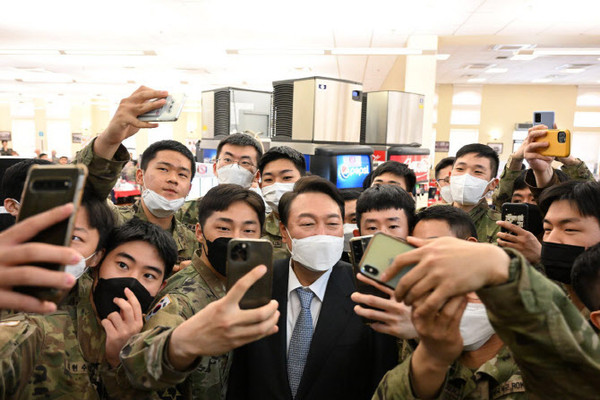
While young, Yoon attended Daegwang Elementary School and Choongnang Middle School in Seoul. After graduating from Choongam High School, he studied law at Seoul National University. He is a colleague of Moon Kang-bae, a lawyer who described Yoon as an "extrovert and faithful" person. Shortly after the Gwangju Uprising, Yoon and his colleagues held a mock trial, where he acted as a prosecutor, demanding the death penalty for Chun Doo-hwan, the President of the Republic of Korea.
Following the mock trial, Yoon escaped to the Gangwon Province.
Yoon was exempted in 1982 from national military service due to anisometropia. Yoon later mentioned that he was unable to obtain a driving license because of the condition.
Yoon passed the first part of the bar exam in Year 4 of university but failed the second. He kept failing for the next nine years. The reasons for his failed attempts are not clear, but the main cause is widely regarded to be the mock trial he held against Chun Doo-hwan. He finally passed the bar in 1991, in the same graduating class as Democratic Party Assemblyman and Minister of Justice Park Beom-kye.
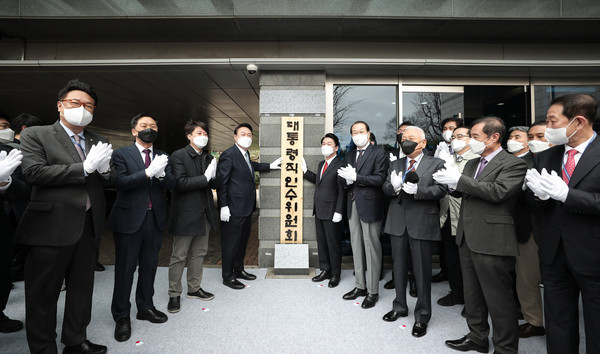
Prosecutorial career:
Yoon started his career at Daegu Public Prosecutor's Office in 1994. He headed the Special Branch and Central Investigation Department, both of which investigate corruption-related cases. In 1999, he arrested Assistant Commissioner Park Hui-won, who was involved in a corruption case in spite of strong objections from bureaucrats in the Kim Dae-jung Government.
In January 2002, Yoon worked briefly as a lawyer at Bae, Kim & Lee but left as he felt that he was not suited for the position. Upon his return as a prosecutor, he prosecuted such pro-Roh Moo-hyun figures as Ahn Hee-jung and Kang Keum-won. In 2006, he apprehended Chung Mong-koo (chairman of the Hyundai Business Group) for his complicity in a slush fund case at Hyundai Motor Company. In 2008, he worked for the independent counsel team resolving the BBK incident related to President Lee Myung-bak.
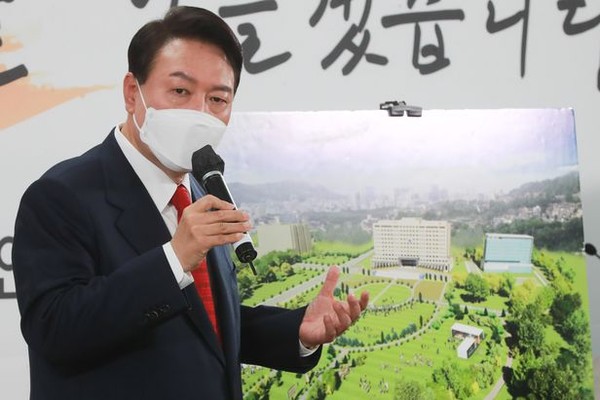
In 2013, Yoon led a special investigation team that looked into the National Intelligence Service's involvement in the 2012 NIS public opinion manipulation scandal. Yoon sought the prosecution of the former head of the NIS, Won Sei-hoon, for violating the Public Official Election Act. He accused Justice Minister Hwang Kyo-ahn of influencing his investigation. As a result, he was demoted from the Seoul Prosecutors' Office to the Daegu and Daejeon High Prosecutors' Office.
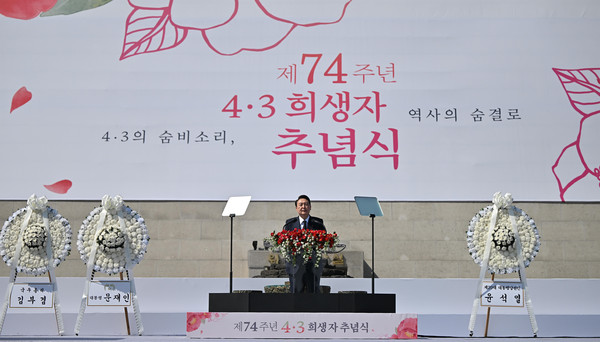
Yoon later became head of investigations in the special prosecutor team of Park Young-soo, which investigated allegations pertaining to the 2016 Choi Soon-sil scandal involving Choi, Samsung Vice-Chairman Lee Jae-yong and then-President Park Geun-hye, which led to the impeachment of the President in December 2016.
On May 19, 2017, the newly-elected President Moon Jae-in appointed Yoon as chief of the Seoul Central District Prosecutors' Office. The prosecution indicted two former Presidents Lee Myung-bak and Park Geun-hye, three former NIS chiefs, former Chief Justice Yang Sung-tae and more than 100 other former officials and business executives under his tenure. Yoon also led an investigation into accounting fraud at Samsung.
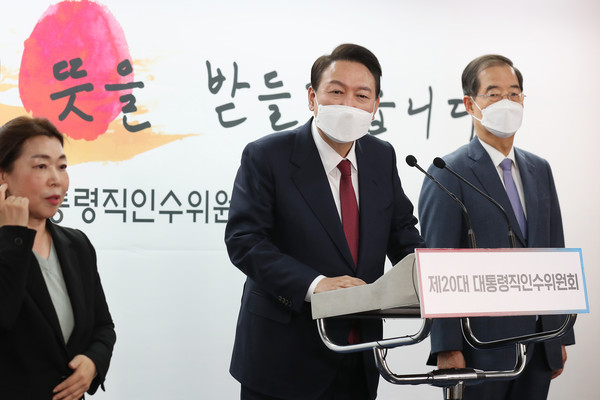
Prosecutor general (2019):
On June 17, 2019, Yoon was nominated as prosecutor general, replacing Moon Moo-il. His nomination was welcomed by the ruling Democratic Party and the Party for Democracy and Peace, but was opposed by the Liberty Korea Party and the Bareunmirae Party. The minority Justice Party remained neutral. On July 16, he was officially appointed as the new prosecutor general and started his term nine days later. President Moon ordered him to be neutral, adding that any kind of corruption must be strictly investigated though it is related to the government.
Yoon has not led investigations against Minister of Justice Cho Kuk, who was involved in various scandals. His decision to prosecute was welcomed by the opposition but was condemned by the Democratic Party and its supporters.
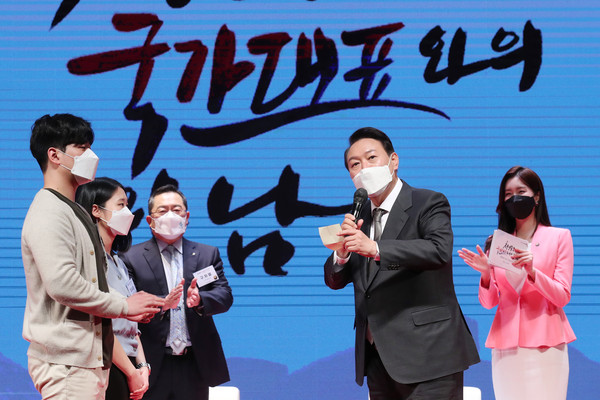
After Choo Mi-ae was appointed the new minister of justice, she took an action against several prosecutors close to Yoon. Choo attributed her decision to Yoon's failure to submit a reorganization plan for his department, which she requested, but this was seen as retaliation by the Presidential Office of Blue House for Cho Kuk's prosecution.
In April 2020, Democratic Party lawmakers again attacked Yoon and called on him to resign as the prosecution started investigations into election law violation cases involving both ruling and opposition politicians and also suspected election rigging of the Ulsan mayoral race for Mayor Song Cheol-ho in 2018 by senior secretaries at the Presidential Mansion of Cheong Wa Dae (Blue House).
Suspension, reinstatement, and resignation:
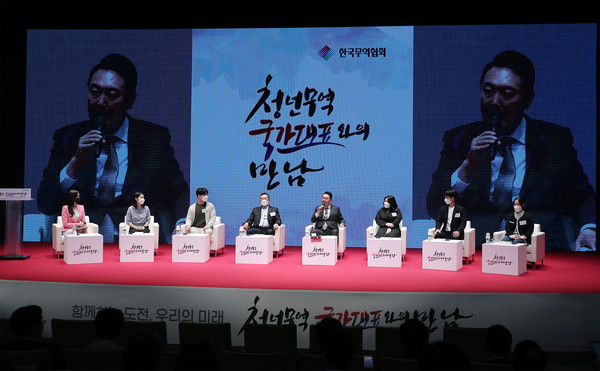
On Nov. 24, 2020, Minister of Justice Choo Mi-ae suspended Yoon from his position, citing alleged ethical violations, abuse of power, and interference into investigations of his associates and family members.
Yoon filed an injunction against the minister's suspension order, which was approved by the Seoul Administrative Court on December 1, temporarily halting the suspension. On December 16, the Ministry of Justice then imposed a two-month suspension on Yoon, accepting four of six major charges for disciplinary action. The decision was subsequently approved by President Moon. However on December 24, following an injunction filed at the Seoul Administrative Court, the suspension was overturned as the court accepted Yoon's claim that the process to suspend him was unfair.
On March 4, 2021, Yoon tendered his resignation, which was accepted by President Moon.
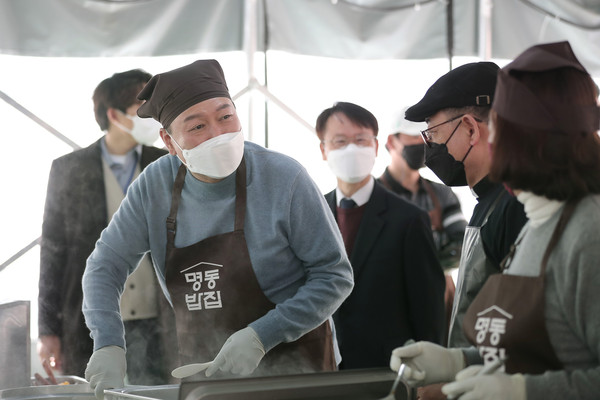
2022 Presidential election:
Yoon had been considered a potential Presidential candidate for the 2022 Presidential election since the aftermath of the Cho Kuk scandal, appearing as a significant candidate in general election opinion polls since at least January 2020. In a January 2021 poll including all possible Presidential candidates, Yoon led as the most favored with 30.4 percent of the vote, more than the individual supports for the ruling Democratic Party frontrunners Lee Jae-myung and Lee Nak-yon.
On June 29, 2021, Yoon officially announced his candidacy in the 2022 Presidential election. On July 12, he registered with the National Election Commission as an independent candidate.
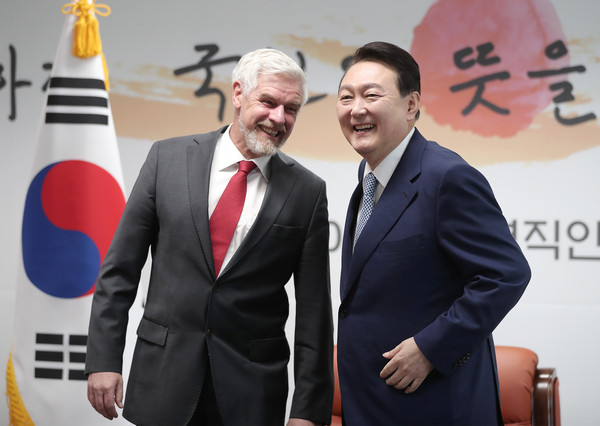
On July 30, 2021, Yoon officially joined the conservative People Power Party, which is currently the main opposition party in the Republic of Korea. Prior to this, Yoon had been a political independent, although his popular support came primarily from conservatives.
Yoon was welcomed into the PPP by Choi Jae-hyung, a fellow 2022 Presidential candidate, in a small public ceremony at the PPP headquarters located in Yeouido, Seoul.
Choi was the former head of the Board of Audit and Inspection and had also just recently joined the PPP, officially having become a member on July 15. Yoon's welcoming ceremony into the People Power Party notably did not include recently elected party leader Lee Jun-seok, who had been outside of Seoul at the time.
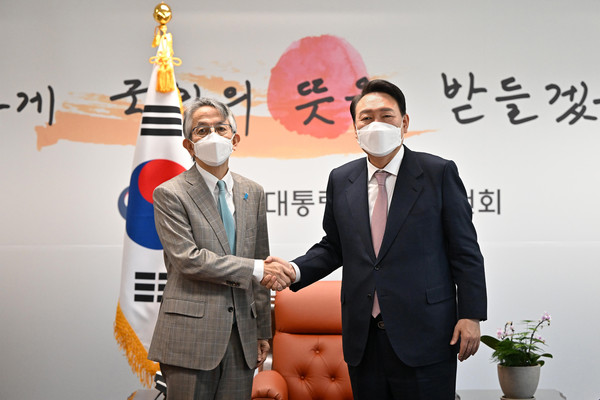
Recently, Yoon made complimentary remarks about former far-right military leader of South Korea, Chun Doo-hwan. The remarks came during a meeting with People Power Party officials in Busan, during which Yoon said that "many people still consider Chun as having done well in politics, except the military coup and the Gwangju Uprising", later adding that he believed even people in Honam, the geographic area including Gwangju, felt the same way.
On Nov. 5, 2021, Yoon officially won the nomination of the People Power Party for the 2022 Presidential election. The victory came after Yoon fought off a surge in support for rival candidate Hong Joon-pyo in the latter weeks of the primary. The nomination resulted from a four-day period of voting by party members and the general public. Yoon Suk-yeol won 47.85% of the votes, a total of 347,963 votes, and of the remaining candidates Hong Joon-pyo won 41.50% of the votes, Yoo Seong-min won 7.47% of the votes, and Won Hee-ryong won 3.17% of the votes.
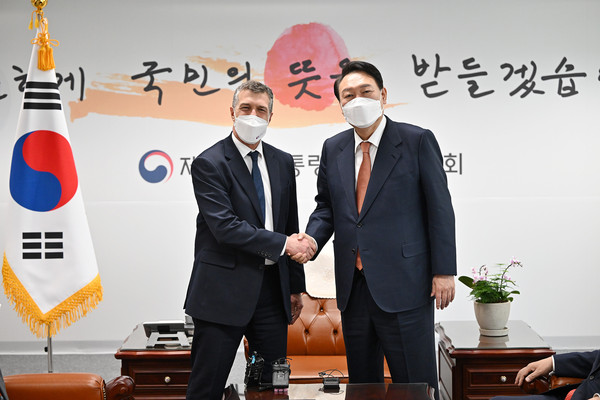
Yoon narrowly won the 2022 Presidential election that took place on March 9, 2022. Democratic Party candidate Lee Jae-myung conceded defeat in the early hours of the following day.
Political positions:
Yoon identifies himself as "conservative." Chung Doo-un, a former conservative member of parliament, has considered Yoon a conservative. Political commentator Chin Jung-kwon, who supports Yoon, called his political inclination "libertarianism."
Multiple news agencies have compared him and his views to those of Donald Trump. Critics of Yoon have described him as a right-wing populist. Sim Sang-jung, 2017 and 2022 Presidential candidate of the centre-left Justice Party, has described the PPP led by Yoon as "far-right populism." Kim Dong-yeon, a former finance minister and independent 2022 Presidential candidate who models himself on centrist French President Emmanuel Macron, has also described Yoon as "populist."
Yoon rejects the populist label, and has called his main opponent in the 2022 election, Democratic Party candidate Lee Jae-myung, a "populist."
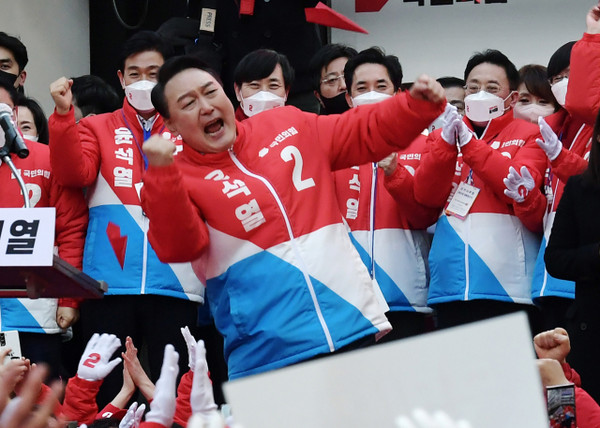
Yoon opposes economic interventionism by the government. He has cited economist Milton Friedman and Friedman's 1980 book Free to Choose: A Personal Statement as a major influence on his belief in economic liberalism.
On Sept. 22, 2021, Yoon stated that he will ask that the United States redeploy tactical nuclear weapons in South Korea if there is a threat from North Korea. Nuclear weapons have not been deployed by the U.S. in South Korea since the early 1990s, after an agreement with Russia and in an effort to ease tensions between North and South Korea.
Speaking for the United States, U.S. Deputy Assistant Secretary of State for Japan and Korea Mark Lambert rejected Yoon's call for the re-nuclearization of South Korea and said the proposal was against U.S. policy. Zhao Lijian, spokesperson of the Ministry of Foreign Affairs of the People's Republic of China, called Yoon's statement "irresponsible."
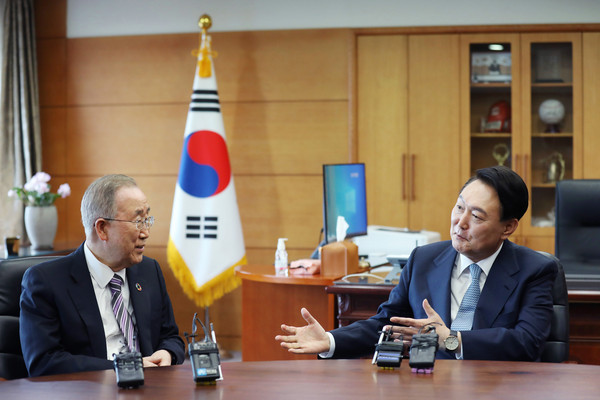
On Nov. 7, 2021, Yoon stated that if elected President he would pardon former Presidents Lee Myung-bak and Park Geun-hye, both of whom were serving lengthy prison sentences for corruption (Park Geun-hye was later pardoned by President Moon Jae-in on Dec. 24 of that same year).
On Nov. 12, 2021, Yoon indicated that he would be open to more U.S. THAAD missile deployments in South Korea.
On Nov. 30, 2021, Yoon said he would abolish the 52-hour workweek and the minimum wage if he became President.
On Jan. 7, 2022, Yoon wrote on his Facebook page, "Abolish the Ministry of Women and Family." The post received a good response from Idaenam, while feminist organizations criticized it as "hate politics." He has been labelled as an avowed "anti-feminist" and claimed that South Korean women do not suffer systemic discrimination, despite what The Guardian described as "voluminous evidence to the contrary."
On March 20, 2022, Yoon announced that he would establish his Presidential office in the Ministry of National Defense building in Yongsan-gu, Seoul, instead of Cheong Wa Dae (The Blue House), which said he would open to the public as a park during his inauguration day.
Personal life:
Yoon has been married to Madam Kim Kun-hee since 2012. Kim is the president of Covana Contents, a company that specializes in art exhibitions.

